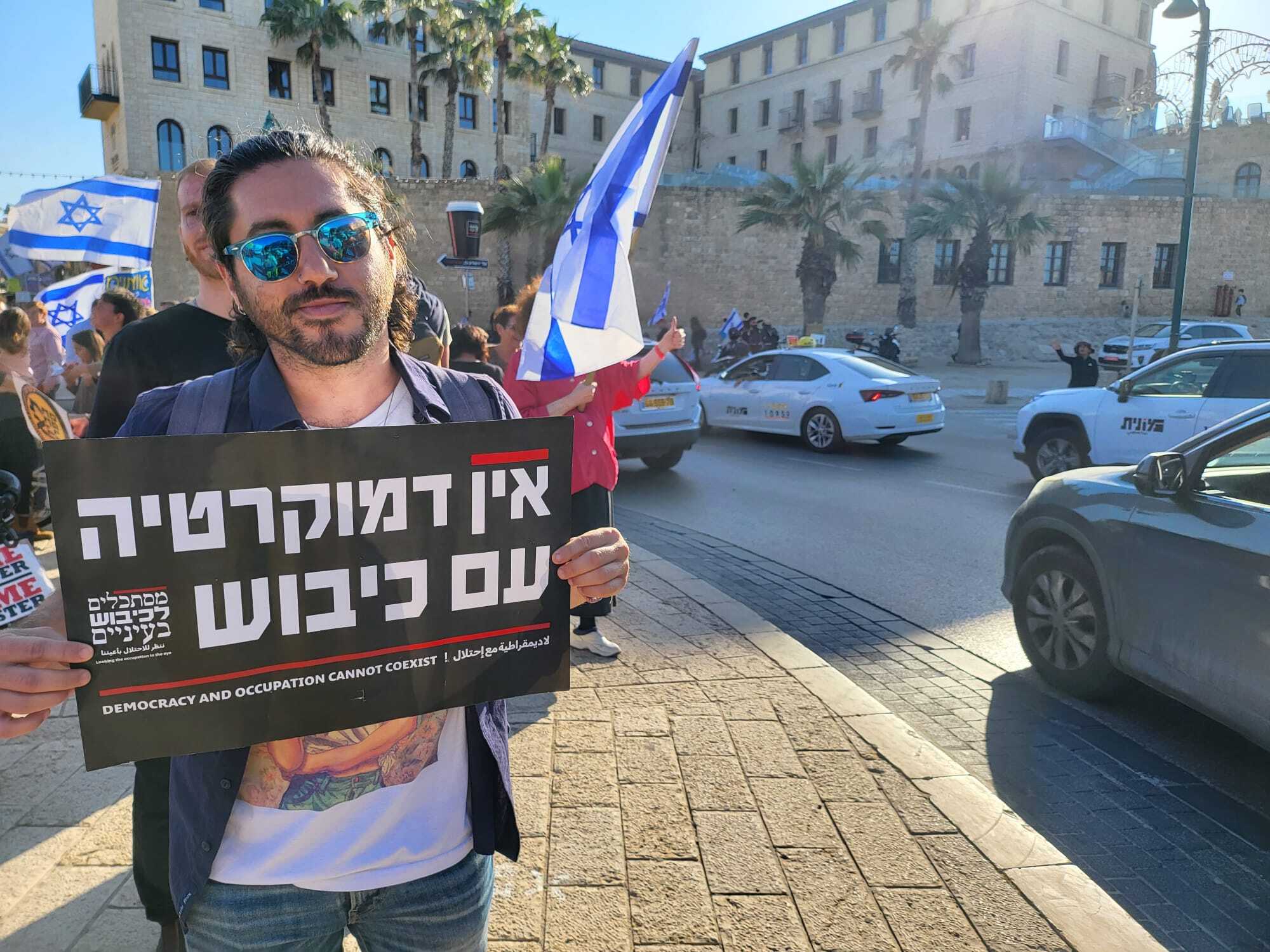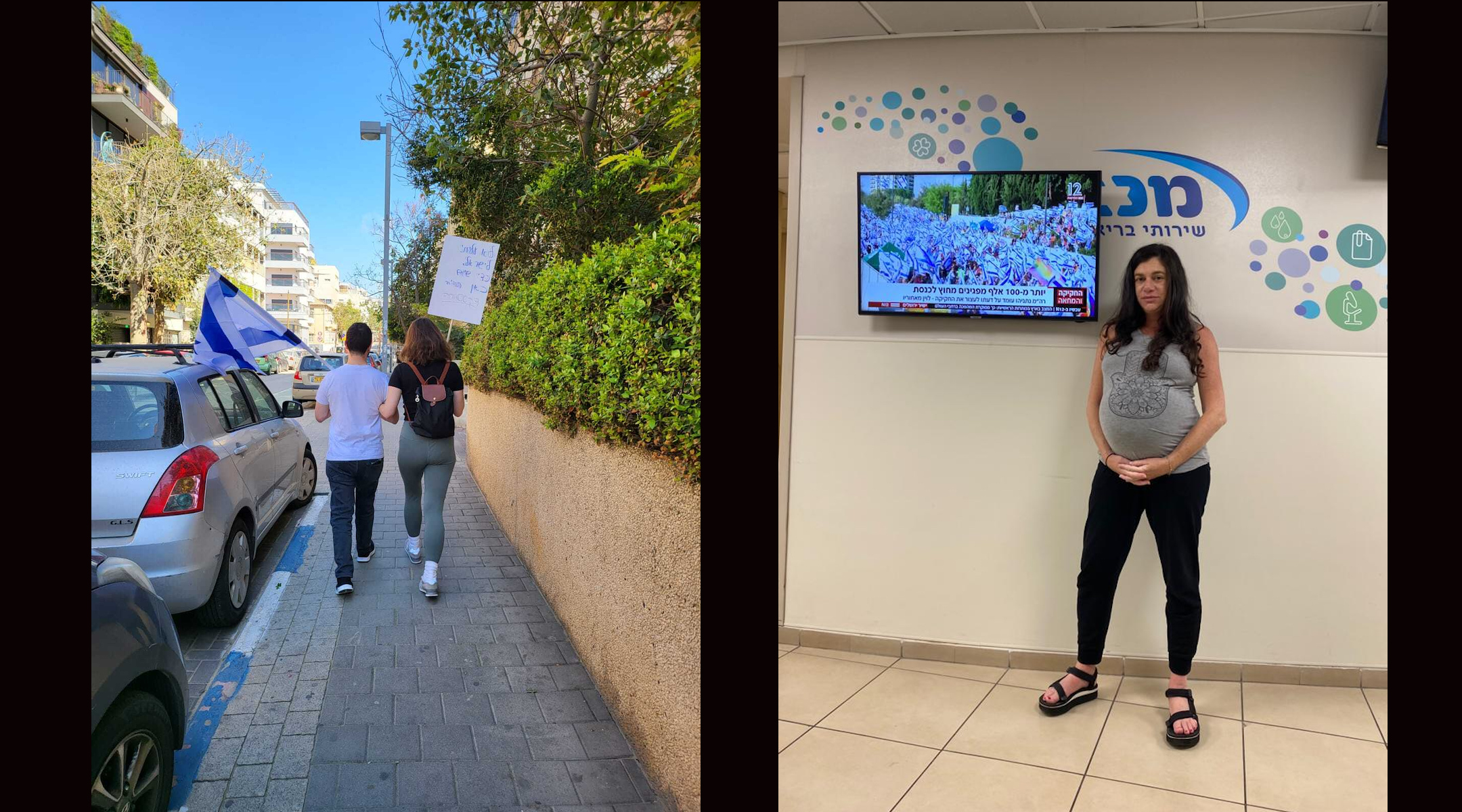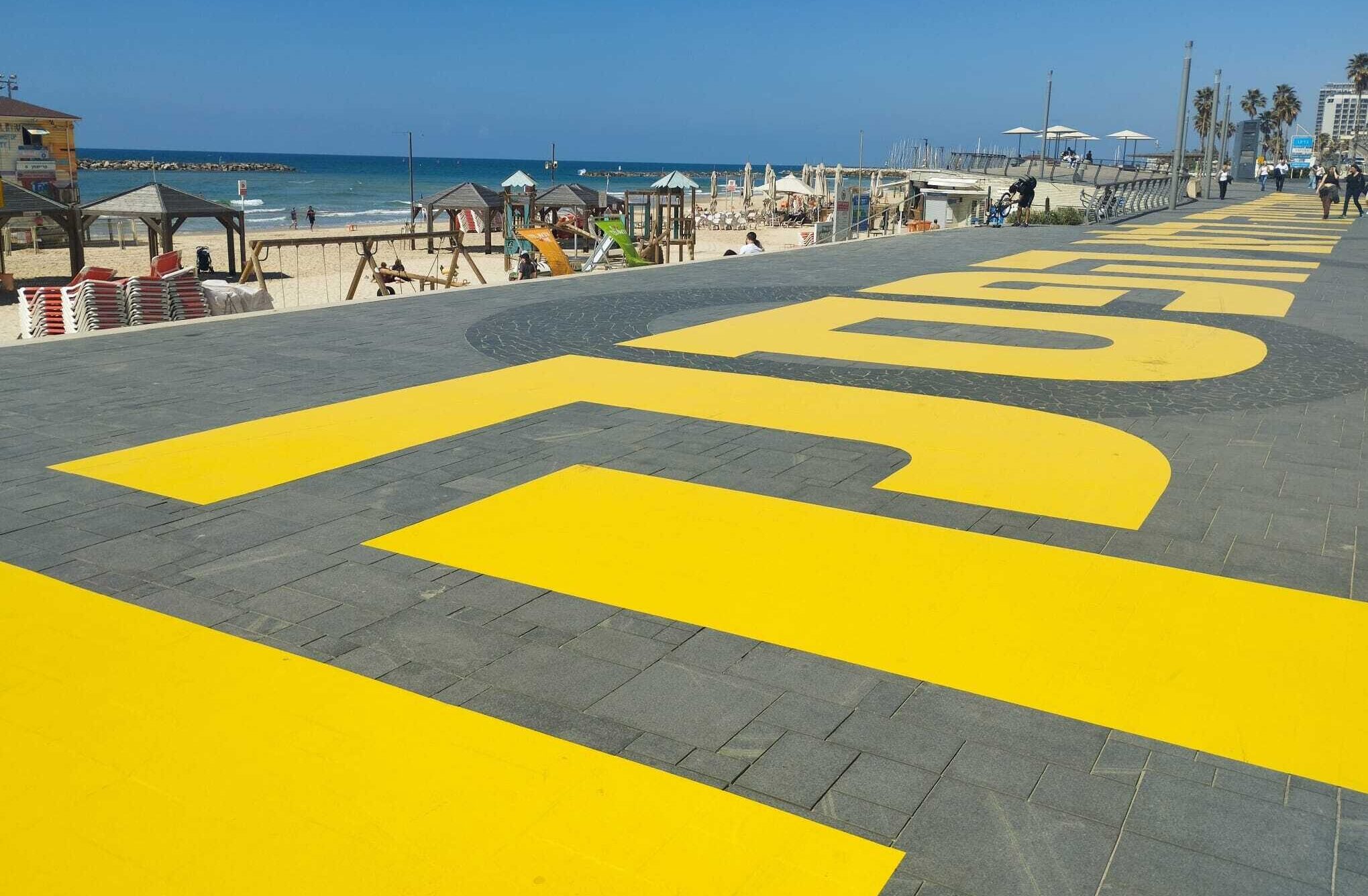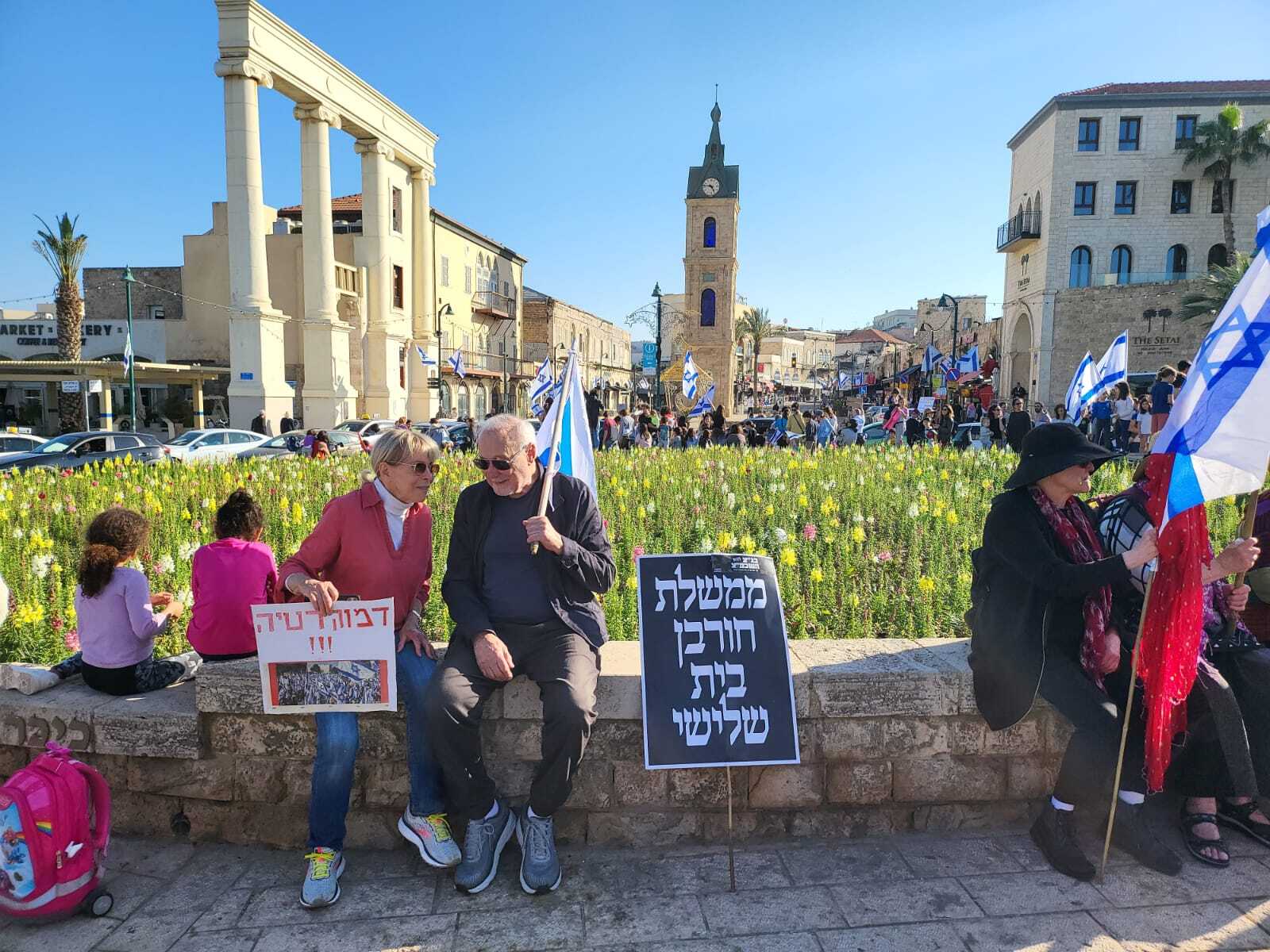TEL AVIV (JTA) — Yaniv, a resident of Tel Aviv, has lost count of how many protests he’s been to during the past three months. But on Monday afternoon, he headed once again to Kaplan Street, the urban artery that has become ground zero of the anti-government demonstrations, to demonstrate once again.
Israel’s current rupture, said Yaniv, 34, is the “biggest crisis in my lifetime.”
“We’ll keep going until something changes,” he said. “They left us no choice. The damage has been done.”
Week after week, Yaniv and tens of thousands of other Israelis have filled the streets of Tel Aviv to protest Prime Minister Benjamin Netanyahu’s proposed overhaul of the country’s judiciary — which would sap the Supreme Court of much of its power and influence. Then, on Sunday night, massive protests again took shape to oppose Netanyahu’s firing of his defense minister, who called for a pause on the legislation.
Now, the following day, the protesters came with a different feeling: that their activism might actually succeed, at least in the short term. After people gathered in Tel Aviv, Jerusalem and elsewhere, Netanyahu announced that he would pause the legislation to allow time for dialogue. Several of his ministers had already called for him to do just that.

Justin Jacobs, a recent immigrant to Israel from the United States, said he is hopeful about the outcome of the protest movement. (Deborah Danan)
But even as the campaign to stall the legislation was poised to achieve an at least temporary victory, protesters were not in a celebratory mood. They vowed to continue demonstrating against what some described as Netanyahu’s broader authoritarian impulses.
“You see how the liberal voice that has been missing for so long is returning to the street and has become the mainstream,” said Ben Luria, a resident of Jaffa protesting in Tel Aviv. “It looks like they’ve succeeded in passing the message across.”
But for Luria, that success doesn’t translate into any desire to ease the pressure. “You can’t deny that this is no longer just a question of Bibi being Bibi, this is a dictator in the making,” he added, using Netanyahu’s nickname. “We need to put the line somewhere.”
Even as Israelis were glued to their TV screens, waiting to hear Netanyahu announce a suspension of the legislation, Daria, who immigrated to Israel with her family from what is now Russia, did not pin her hopes on Netanyahu changing course.
“I don’t think that even if they stop this legislation, they will stop anything else,” said Daria, who came to the protest with Yaniv and, like him, declined to give her last name. “Even if they say they’ll postpone until Pesach or for forever, that doesn’t mean that we stop protesting what this government is doing.”
Sunday night’s protests were followed by a countrywide general strike. Blocked streets and canceled bus routes in downtown Tel Aviv meant that a 20-minute journey to a high-risk pregnancy clinic on Monday instead took an hour and a half for Natalie Solomon, who is eight-and-a-half months pregnant. She said she hoped Netanyahu would concede and spare Israelis further disruption.
“Our country is falling apart,” she said, expressing her hope that an end to the political standoff is near. “I really hope Bibi backs down today, that’s the only option. … We care about democracy but we really just care about the health of our baby.
At the end of the day it really does disrupt day-to-day lives.”
Despite being on the cusp of their first major victory, protesters said the potential respite offered by Netanyahu would be a minor gesture, not one that could overcome the hard feelings that have built up over the past three months.
Justin Jacobs, an immigrant to Israel from Lancaster, Pennsylvania, said Israel has “turned a corner” after Sunday night’s protests.”So, [there’s] a glimmer of hope that we’ll go back to the status quo, which to me remains not good enough,” he said. “But not good enough is still better than horrifying.”
Others were less optimistic. “My feeling, the feeling of my parents, my grandparents, [is] that there’s no future here, I don’t know if I’ll raise kids here,” said Yotam Weingrad.
Like Weingrad, Daria, recalling her family’s experience, is also considering her future in the Jewish state.

Yariv and Daria, left, walk in Tel Aviv after participating in anti-government protests on Monday, March 27, 2023; at right, Natalie Solomon said her trip to a high-risk pregnancy clinic took more than four times longer than normal because of the protests. (Deborah Danan)
“I grew up in a family with intimate knowledge of what it feels like to live under oppression, and I feel like it’s our duty to do whatever we can to prevent it,” she said. “But if push comes to shove, if nothing’s going to change, I’ll make the same decision my parents did — my kids aren’t going to live in a dictatorship.”
For those not emotionally invested in the Israeli crisis, the streets of Tel Aviv on Monday provided a rare experience, and a sense of uncertainty. Jennifer, a tourist from Utah visiting Israel with her two daughters, Holly and Diana, wanted to know if “it is going to get scary” and wondered if they’d be able to get back to the United States, as airports had closed due to the general strike.
“We’ve never been to this part of the world so we’re kind of like ‘Wow,’ just taking in everything,” said Diana. “We don’t know what it’s like without the protests, and we’re like, ‘This is Tel Aviv. It’s a lot.’”
Support for the protests isn’t unanimous across Tel Aviv, a bastion of left-wing politics in Israel. Josh Eidelshtein called the protests “hypocritical,” and blamed them for fanning the flames of conflict.
“What if the protesters were right-wingers, Orthodox Jews, or Palestinians?” he said. “Would their strategies still be OK? There is too much hate being bred here, and it’s as if the collective stress and anxiety this country has lived on for so long has been set aflame. The same people who went out to vote [for the left] are now trying to work against the system because they didn’t get what they wanted.”
Khalil, who originally hails from the Arab village of Ein Hawd in Israel’s north, and has lived in Tel Aviv for 50 years, also opted to stay away from the protests, which he felt did not speak for him.
“The Arabs are a minority, what do they have to do with these protests?” Khalil said as he walked his dog near a giant yellow sign reading “Nonstop Democracy,” painted by the Tel Aviv municipality on the boardwalk.
“Bibi has done good things but now he’s silent. This is a man who knows how to speak,” Khalil said. Then, referring to Netanyahu’s coalition partners, he added, “He’s not the king of Israel anymore. He made big mistakes by taking those criminals into the government with him. They want to throw out all the Arabs.”
Also sitting out the protests was Meir Dayan, who counts himself among the supporters of Netanyahu’s proposed judicial reform. He is especially in favor of the legislation that was due to be brought for a final vote on Monday, which would have increased the governing coalition’s control over Supreme Court appointments. But Dayan added that he didn’t appreciate the way Netanyahu attempted to pass the measures into law.

The path along the beach in Tel Aviv has been painted with pro-democracy messages. (Deborah Danan)
“The way they went about it was reckless,” he said. “Change to heavy organizational processes — because this is what this basically is, after all — doesn’t happen with legislation, it happens with people. It must be bottom-up and from a place of education, not ignorance.”
Dayan predicted that Netanyahu will halt the legislation now, and then in the summer months “when the left are overseas,” he will return it to the Knesset floor.
Roughly four miles away from the main protest, a smaller demonstration coalesced near Jaffa’s clocktower, a landmark at the entrance to Tel Aviv’s older counterpart. At this protest, children as young as 5 chanted “Shame!” and “Save Democracy!” while their parents stood to the side.
“Here the adults are quiet so the children are taking the lead. It’s exciting,” said Gavri, 10.
There are a few things he’d like to bring about in Israeli society: the failure of the judicial overhaul, as well as an end to fighting between Jews and Arabs. Like the adults protesting across the city, he vowed not to give up.
“I will be here until the end,” he said. “I hope it won’t be a long time.”
JTA has documented Jewish history in real-time for over a century. Keep our journalism strong by joining us in supporting independent, award-winning reporting.






